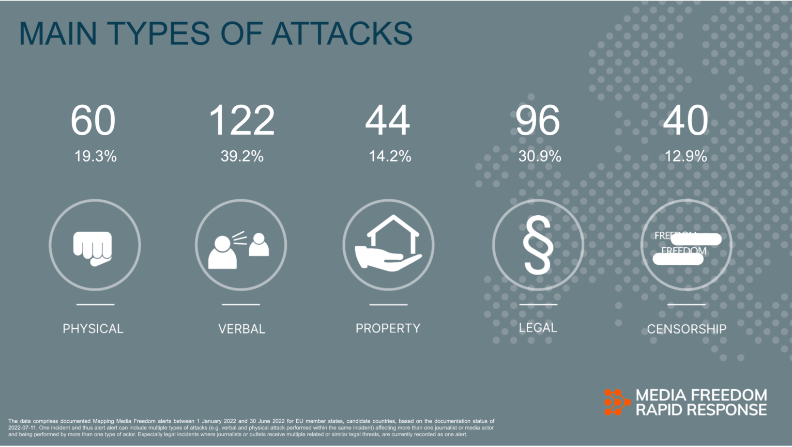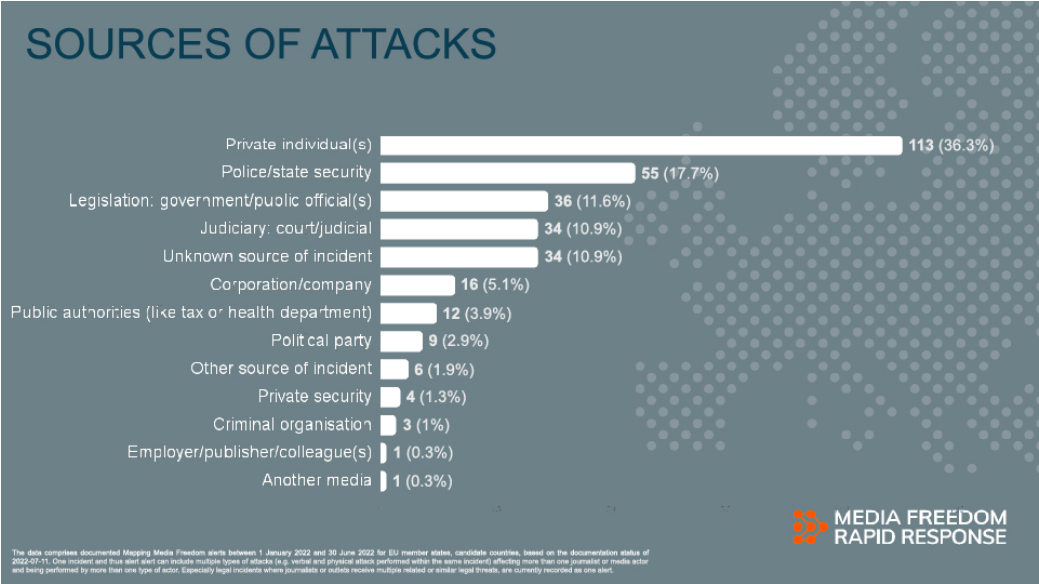The government’s attempts to block access to information and developments in the case of murdered journalist Daphne Caruana Galizia were among the nine alerts documented by the latest Media Freedom Rapid Response (MFRR) monitoring report.
The latest report found that in the first six months of the year, 311 media freedom violations were recorded in 29 countries, involving 552 persons or entities related to media, including journalists, media companies, family members, journalists’ sources, and NGOs fighting for press freedom.
Overall, verbal attacks, including harassment and threats, were the most common types of violations, making up 39.2% of the total number of attacks.
This was followed by legal incidents (30.9%) and physical attacks (19.3%). Attacks to property made up 14.2% of alerts, and 12.9% of alerts were linked to censorship, such as blocked access to information.

Main types of attacks registered by the Media Freedom Rapid Response in the first half of 2022. Source: MFRR
Private individuals remained the main source of attacks on journalists and media workers (36.3%), followed by police and state security (17.7%) followed by the government and public officials (11.6%).
Legal cases make up the bulk of alerts in Malta
In Malta, the alerts include how in February, Yorgen Fenech, charged with masterminding and financing Daphne Caruana Galizia’s assassination, requested in court a copy of the data related to Caruana Galizia’s phone – a move that was recognised as a ‘legal incident’ and a ‘violation of anonymity’ causing concern about the protection of Caruana Galizia’s sources.
The report also describes the government’s lack of transparency ahead of the elections in March 2022, as Prime Minister Robert Abela, on multiple occasions, refused to answer questions by reporters from independent media outlets about his alleged links to suspicious deals involving alleged criminals and on how his party’s electoral campaign promises would be financed.
Legal cases made up over half of the alerts in Malta documented on MFRR website.
One of these was the instance of the 30 different government ministries and entities that in January appealed against a decision by the Information and Data Protection Commissioner who ordered the disclosure of information on the use of public money requested through Freedom of Information (FOI) by The Shift.
The appeals filed to conceal ministers’ PR contracts and advertising expenditure with Media Today co-owner Saviour Balzan, which the Information and Data Protection Commissioner has ruled should be published, have increased to 40. As the Appeals Tribunal rules on each case in favour of the Commissioner and The Shift, the different government departments and agencies are filing a second appeal in court.
The report further underscores how these incidents go against the European Commission’s Recommendation on the protection, safety, and empowerment of journalists, which was published a year ago.

Sources of attacks against media workers and journalists. Source: MFRR
Ignoring the European Commission’s recommendation
Although the Recommendation is non-binding, it is meant to be “a strong call” to the Member States to push them to put forward measures to improve the safety of journalists and media workers in the European Union.
It was written based on international standards on freedom of expression, highlighting Member State’s obligation to provide an enabling environment for the media and journalists through legal, administrative, and practical measures.
One of the points in the Recommendation says that the Member States should “ensure that journalists can attend and ask questions at press conferences and events”, the MFRR documented several restrictions against this principle including in countries like Malta and Poland.
Despite assurances by Prime Minister Robert Abela to international press freedom NGOs in October last year about his commitment to ensuring media freedom and the safety of journalists, to date, almost nothing has been done to honour that commitment.
Since the Labour Party came into power in 2013, Malta’s press freedom ranking plummeted a staggering 36 places, from number 45 in 2013 to number 77 in 2019, and losing a further four places in 2020 placing the country at 81, a score that remained unchanged until last year.
Although Malta’s press freedom environment registered a slight improvement this year, this was largely due to the conclusions and recommendations by the public inquiry board tasked with establishing the extent of the State’s role in the assassination of journalist Daphne Caruana Galizia.
The government has yet to implement any of the public inquiry’s recommendations. The only recommendation that has been partially undertaken thus far, was the appointment of a committee of media experts to review draft media legislation prepared by the government, a move that was also mired in controversy and lack of transparency.
The MFRR report has been compiled by the International Press Institute (IPI), the European Federation of Journalists (EFJ), and the European Centre for Press and Media Freedom (ECPMF), in the context of the joint Media Freedom Rapid Response (MFRR) project which monitors and supports journalists, media workers, and platforms that have been threatened.













muvument korrott jistma lill-kulhadd f’ghajnu. Isthu nies korrotti w hallelin. Fejn hi l-Ewropa meta wiehed ikollu bzonnha? Mafiamalta controlled by mafia bosses and their corrupt friends.